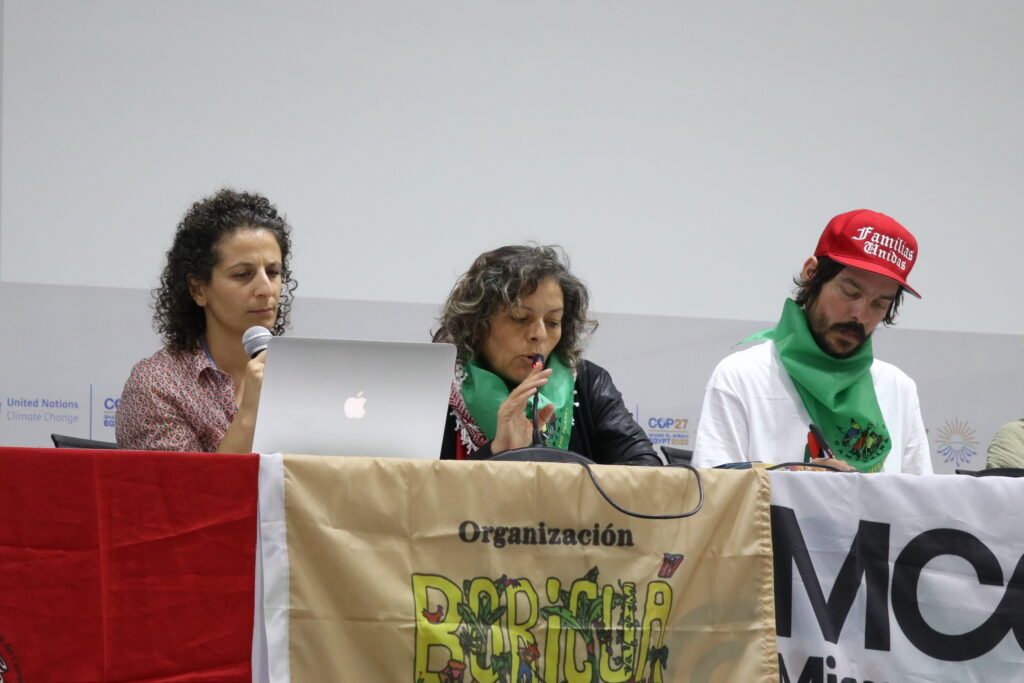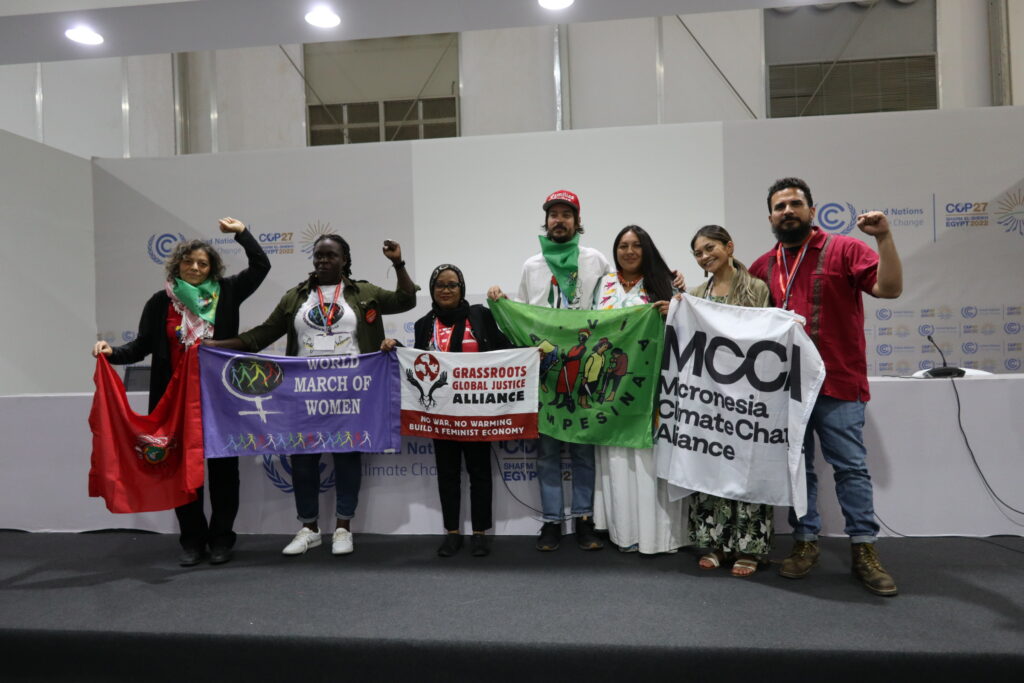Sharm el Sheikh, Egypt – Of all the big polluters contributing to the climate crisis, the military is perhaps the most intentionally invisibilized. Inside COP27 here in Egypt, the “parties” that dictate the decision-making of the conference have spent two weeks touting their so-called “green” solutions to global warming and ocean acidification. While much ink has been spilled and empty words have been spoken about reducing the carbon footprints of big business, states have kept conveniently silent on the militarized projects they financially prioritize to gain and maintain their imperial power.
Within La Vía Campesina, we would like to see this change by exposing it as a major form of social and environmental injustice. We are certainly not alone, and we are doing this work to raise our voices as part of a growing chorus of movements.

Our last official speaking event of COP27 last week on 17 November was a testimony to how we put these relationships to work in the service of joint visions. It was a climatic educational forum called “No War, No Warming: Demilitarization and Climate Justice” which featured, in addition to La Vía Campesina, Grassroots Global Justice Alliance, Desis Rising Up and Moving, Micronesia Climate Change Alliance, and the World March of Women. La Vía Campesina was represented by its member organizations from Tunisia, Million Rural Women and the Landless, and from Puerto Rico, Organización Boricuá de Agricultura Ecológica de Puerto Rico (Boricuá).
Torkia Chaibi of Million Rural Women in Tunisia situated the politics of militarization and climate change in the Arab Region and North Africa during her opening remarks. Starting from such a knowledge base is significant for multiple reasons: First, Egypt as the host country of COP27 straddles these geopolitical spaces. Second, the area is among the most desertified areas of the world that is most vulnerable to climate chaos. Third, Arab countries and broader North Africa are among those most targeted by militarization and imperialism from abroad. And finally, it is a key regional frontier for transnational social justice movements including La Vía Campesina.
“Extractive industry and the financialization of nature always aggravate climate change, because they are driven by an exploitative and ruthless thirst for profit and for power,” said Torkia. She detailed: “The fairytale of clean energy serves as a distraction from the many wars that plague us around the world. Wars are happening in Ukraine and elsewhere, but they are the most concentrated and protracted in the Arab world, including countries like Yemen, Iraq, Syria, and Palestine.”
Tunisia’s Million Rural Women, like its Moroccan and Palestinians counterparts in La Vía Campesina, seeks to use agroecology as not only a way to achieve food sovereignty, but also as a path towards broader sovereignty that could demilitarize and decolonize territories. In the Arab Region and North Africa, this often comes down to issues around water. A key step in the resolution of these conflicts is implementing the United Nations Declaration on the Rights of Peasants and Other People Working in Rural Areas (UNDROP), which contains clear stipulations on the rights to water and self-determination. Article 21.2, for example, states that “[Peasants] have the right to equitable access to water and water management systems, [and] to be free from arbitrary disconnections or the contamination of water supplies […]”
Of course, as serious as these threats are in the Arab Region and North Africa, they are global ones that are in no way confined there, as empire knows no boundaries. Fortunately, our movements and the political frameworks that we use to defend our territories are equally unrestricted by borders.
“We feel a strong spirit of international solidarity and community in this room,” Jesús Vasquez said with a sideways glance down the table of fellow speakers. Jesús pointed to two periods that ushered in colonialism and militarization in his native Puerto Rico, the Indigenous home of the Arawak people referred to as the islands of Borinquen in the Taíno language. The Spanish came in 1493, bringing the islands under the Spanish Crown, with control only wrested away by the United States in 1898 under false pretenses of “liberation”. Today, Puerto Rico remains a modern-day colony of its massive northern neighbor, and this status can be felt in nearly all aspects of life throughout the tiny archipelago.
“What we hope to achieve through agroecology is a complete paradigm shift,” Jesús offered. He added: “This is not about us going off the grid, but rather studying what is needed to do strong base-building work that occurs when we mobilize our communities in different ways. Only then can we understand how to expand our struggles through international solidarity.” Boricuá puts this into action in the Caribbean region under the interlaced banners of La Vía Campesina and Coordinadora Latinoamericana de Organizaciones del Campo (CLOC / Latin American Coordination of Rural Organizations). The Puerto Rican movement also participates in allied North American spaces such as the U.S. Food Sovereignty Alliance and the Climate Justice Alliance, both of which are committed to and active in anti-militarization work.
Coming together with allied social movements in moments like these reminds us of the power of our solutions when we bring them together from across constituencies, regions, issues, and generations. We learn a lot from one another, and redouble our joint commitment to keep our messages potent in the faces of the powers that would prefer for us to water them down. And when it comes to climate justice, food sovereignty, and related demands for our peasant and rural worker members, the resounding message is clear: “No War, No Warming!” We are now on our way home to continue down the long road of that work.


